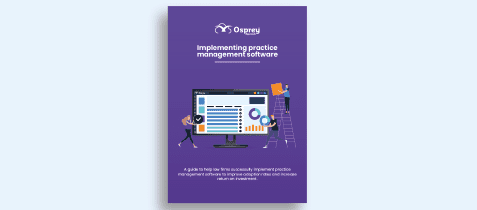Contents
Consult your accounts department when purchasing new legal tech
Implementing a new practice and case management software solution into your law firm isn’t always a quick and easy process. Months of reviewing, discussing, comparing, and migrating requires a lot of resource up front that practices often struggle to find. It can prove to be a costly mistake when the software implemented isn’t suitable for your firm, but that is easily avoided with more up-front due diligence and preparation that help to maximise success.

Alex Simons, the New Business Manager at The Law Factory, spoke with Osprey about the importance of involving your accounts department in the software purchasing process. Alex started his career as a legal cashier, and with over 20 years’ experience in the legal industry, he believes collaborating with your accounts team is crucial to maximising return and utilisation of a new practice and case management solution (PCMS).
The importance of involving your accounts team
PCMS helps to improve efficiencies and streamline processes across an entire law firm. From document production to client onboarding, time recording, billing, and reporting, a PCMS helps to digitally transform all processes to improve performance. Importantly, the solution also helps to centralise data and documents for a more connected and reliable operation.
This means that, to get the most from your new software solution, you need to include all areas of the business in the purchasing and implementation process to ensure you have a true representation of the processes, needs, and challenges of all departments and roles.
A law firm’s accounts department sits at the heart of the practice and ensures the financial stability and cashflow of the business is optimum. For a new software solution to provide return, it needs to positively impact the financial performance of the firm. That is why it’s important to involve your accounts department, from the initial researching and discussion, to guarantee the new system meets their needs.
The risks of not involving the accounts department
No buy-in or adoption by the team
Without firm-wide utilisation of the new software you implement, it’ll be impossible to experience the full scope of benefits and return that you’ll have expected at initial purchase. Ensuring your accounts team, as well as all other departments, are involved at the earliest stages of the software purchase is crucial to improve buy-in. Without involvement during the purchasing process, the team won’t be able to voice their requirements or worries, therefore will feel like the change is being done to them, rather than with them, which can cause tension. To maximise adoption, and therefore return, involve the team as much as possible to ease concerns and effectively communicate benefits.
Reduction in software functionality
If the accounting software is considered an afterthought to purchasing the case management solution, you may overlook key functionality that is crucial and required to successfully manage your legal accounts. Involving your accounts team early in the process will ensure your existing processes and software needs are documented so they form the final purchasing decision. This will improve buy-in and adoption by the team but will also reduce compliance issues or operational challenges once implemented.
Risks of compliance breaches
It’s crucial that your software enables your firm to be SRA compliant and it’s the responsibility of your COFA to ensure this throughout your firm to avoid costly penalties and actions. Your accounts team and COFA have the extensive knowledge to know what is needed to reduce risk and follow best practices. Ensure your accounts team are involved so these factors aren’t overlooked in the buying process.
Documenting your current accounting processes
A successful PCMS implementation starts long before discussions with potential suppliers or wish lists of features. Firstly, firms should look to map out their current processes and daily tasks, within each department, to understand current strengths and weaknesses. It’s important that those on the ground are involved in documenting processes to ensure you have an honest representation of what happens day-to-day, rather than what is expected or assumed.
All roles and departments should look to review their current operations to identify priority areas for development as well as a continued plans for improvement. This will highlight the key ‘must-have’ features your new software needs to have, as well potential ‘wish-list’ features that will help to improve the efficiency of current processes and support the team in the future. Here, the accounts team want to look at how they currently source information, bill clients, and report on performance. Alex Simmons discusses the key questions your team need to answer when documenting their processes that will help to create a scope for what is needed in a new solution.
Sourcing information
- How do you currently source information?
- Do you rely heavily on paper slips?
- Have you upgraded to digital spreadsheets?
- Are emails being sent back and forth between fee earners, directors, and the accounts department?
- Do you spend a lot of time chasing information?
- How often does the current processes create errors?
- Is your case management system currently integrated with the accounts software?
The billing process
- Are bills created by fee earners?
- Are they being printed or emailed to the accounts department?
- How are the bills collated if they’re being printed?
- Does the accounts department need to search for a physical form or use word processing software like Microsoft Word to render a bill manually?
- Do you always have the information you need when you need it?
- How often does the current process create errors?
Bank reconciliations
- Are you manually checking data from printed bank statements?
- Does the current software receive data straight from your bank?
- Can you view copies of bank reconciliations from the current system?
- How do you compile and complete your ledgers currently?
- How long does it take to complete your bank reconciliations?
- How often does the current process create errors?
Month-end reports
- Can these reports be exported into a PDF file?
- Can they be mailed or sent to a secure folder?
- How long does it take to pull the reports you need every month?
- How much manual administration is needed to create the reports?
- Does everyone who needs it, have access to the reports?
- Are the reports you’d like but currently can’t create?
- How often does the current process create errors?
Using your insights to find the right software for your firm
Now that you have documented all the existing accounting processes, you’ll have new insights at what is possible with your firm’s current methods. With this knowledge, you’ll know what features of a new system would be most appropriate for your firm. Your list of features should detail those that are necessary to your firm’s operation and ones that would be nice to have but aren’t vital.
These features will also make finding the right software supplier easier. When researching the many types of software, you will know exactly what to look for, helping to narrow down potential options and providers.
Once you’ve short-listed some potential suppliers, prepare questions about your current processes and software features to ensure you select the right supplier.
- How do postings work, and will it be faster than your current methods?
- How are specialist postings handled, such as with conveyancing or legal aid?
- Can the software do bespoke reporting? Can they be edited and / or filtered?
- How is VAT dealt with? Is it better or worse than the new software?
- Are there specific things your firm needs to run the software properly?
By asking right questions in the selection process, you’ll ensure the new software is a good fit, which will give your accounts team confidence in the benefits they’ll experience.
The benefits of implementing the right legal software
Whilst the review and selection process of new legal tech might be time-consuming and lengthy, it will ensure the software you implement is suitable for your firm long-term, so you can continue to maximise return and build solid digital foundations for your business. Firm-wide involvement in the purchasing processes will improve utilisation so you can experience the benefits right from initial implementation. With the right software solution in place, your firm will benefit from:
An integrated single source of truth
With the right PCMS in place, you can centralise and connect all your data, documents, and processes for a more streamlined operation. Firm-wide accessibility to the same real-time data helps ensures all departments and processes become more efficient and it’ll reduce the risk of inaccuracies.
Your accounts department can ensure cashflow and financial performance is reliable, and they can rely less on manual and paper-based processes that can cause delays and costly errors. A single source of truth, and a fully integrated platform also provides 360-degree visibility of performance, which enables smarter business decisions that can mitigate risk, better predict future trends, and drive the firm in the right direction.
A digital-first firm
When your firm’s processes and data are digitised into one centralised platform, you can run a digital-first operation that will future-proof your business. Giving your firm a digital-first model allows you to run a firm that isn’t restricted to a physical location, giving you the freedom to provide a frictionless experience and service for both your firm and your clients. This also means that you can run your firm completely paperless, reducing the costs on printing and postage, while also greatly speeding up the billing process.
Mitigate risk and reduce errors
Digitised and centralised operations help to reduce errors because data is inputted once and accessible by all and re-usable across documents, reports, and departments. Making your processes digital enables you to implement workflow automation, reducing the potential for human error and significantly speeding up operations.
Keep your accounts team involved
Implementing new practice and case management software impacts and benefits the entire firm, which is why it’s important all teams, including your accounts department, are involved in the purchasing process; from understanding the initial goals and benefits, to documenting system wants and needs. A firm’s financial stability is tied to the accounts department, so it is vital that they are involved in the selection of a software solution to avoid risks to performance, compliance, and workplace tension.
If you would like to learn more, Alex Simons hosted a video presentation on this topic in more detail. Click the video below to watch the archive:




